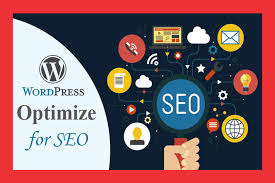The Importance of WordPress SEO Optimization
WordPress is a powerful platform for creating websites, but without proper SEO optimization, your site may struggle to rank well in search engine results. SEO (Search Engine Optimization) is essential for improving your website’s visibility and driving organic traffic to your site.
Key Steps for WordPress SEO Optimization:
- Keyword Research: Identify relevant keywords that your target audience is searching for. Use tools like Google Keyword Planner or SEMrush to find high-traffic keywords with low competition.
- Optimize Meta Tags: Ensure that your meta title and meta description contain relevant keywords and accurately describe the content on each page of your website.
- Create Quality Content: Publish high-quality, engaging content that provides value to your audience. Use relevant keywords naturally throughout your content to improve search engine rankings.
- Optimize Images: Use descriptive filenames and alt text for images on your website. This helps search engines understand the content of your images and can improve your site’s overall SEO.
- Mobile-Friendly Design: Make sure your website is responsive and optimized for mobile devices. Google prioritizes mobile-friendly websites in search results, so having a responsive design is crucial for SEO.
- Internal Linking: Link to other pages within your website to improve navigation and help search engines discover and index all of your content. Internal linking can also help distribute link equity throughout your site.
Plugins for WordPress SEO Optimization:
There are several plugins available for WordPress that can help streamline the SEO optimization process. Some popular plugins include:
- Yoast SEO: A comprehensive SEO plugin that helps optimize meta tags, create XML sitemaps, and analyze content readability.
- All in One SEO Pack: Another powerful plugin that offers features like XML sitemap generation, social meta tags, and advanced canonical URLs settings.
In conclusion, optimizing your WordPress website for SEO is essential for improving search engine rankings and attracting organic traffic. By following best practices and utilizing plugins designed for SEO optimization, you can enhance the visibility of your site and reach a wider audience online.
8 Key Advantages of WordPress SEO Optimization for Boosting Your Online Presence
- Improved search engine rankings
- Increased organic traffic to your website
- Enhanced visibility for your content
- Better user experience through optimized design and structure
- Cost-effective way to attract targeted traffic
- Ability to track and analyze performance with SEO tools
- Boosted credibility and trustworthiness with higher search rankings
- Long-term benefits for sustainable online presence
7 Challenges of WordPress SEO Optimization You Need to Know
- Steep Learning Curve
- Plugin Overload
- Maintenance Required
- Risk of Over-Optimization
- Competition
- Algorithm Changes
- Technical Issues
Improved search engine rankings
WordPress SEO optimization offers the significant benefit of improved search engine rankings. By implementing SEO best practices, such as keyword optimization, meta tag enhancements, and quality content creation, WordPress websites can climb higher in search engine results pages. Higher rankings mean increased visibility to potential visitors, leading to more organic traffic and better chances of attracting target audiences. Improved search engine rankings through WordPress SEO optimization can ultimately boost website credibility and authority in the online realm.
Increased organic traffic to your website
WordPress SEO optimization offers the significant benefit of increasing organic traffic to your website. By implementing effective SEO strategies such as keyword research, content optimization, and technical enhancements, your WordPress site can rank higher in search engine results pages. This improved visibility leads to more organic clicks from users actively searching for relevant information or products, ultimately driving a steady flow of valuable organic traffic to your website. Increased organic traffic not only boosts your site’s credibility and authority but also enhances the potential for attracting qualified leads and converting them into loyal customers.
Enhanced visibility for your content
WordPress SEO optimization offers the significant advantage of enhanced visibility for your content. By implementing SEO best practices such as keyword optimization, meta tag enhancements, and quality content creation, your WordPress website becomes more visible to search engines like Google. This increased visibility helps your content rank higher in search results, making it easier for users to find and engage with your website. Ultimately, improved visibility through SEO optimization can drive more organic traffic to your site and boost your online presence effectively.
Better user experience through optimized design and structure
WordPress SEO optimization leads to a better user experience by focusing on an optimized design and structure. By implementing SEO best practices such as improving site speed, organizing content effectively, and ensuring mobile responsiveness, WordPress websites become more user-friendly and intuitive to navigate. A well-structured website not only helps search engines crawl and index content more efficiently but also enhances the overall user experience, leading to increased engagement and satisfaction for visitors. Ultimately, prioritizing optimized design and structure through SEO optimization on WordPress can positively impact user retention and conversion rates.
Cost-effective way to attract targeted traffic
WordPress SEO optimization is a cost-effective way to attract targeted traffic to your website. By implementing SEO best practices on your WordPress site, you can improve your search engine rankings and increase visibility to users actively searching for the products or services you offer. This targeted traffic is more likely to convert into leads or customers, making SEO optimization a valuable investment for maximizing the effectiveness of your online presence without the need for expensive advertising campaigns.
Ability to track and analyze performance with SEO tools
One significant advantage of WordPress SEO optimization is the ability to track and analyze performance using a variety of SEO tools. By leveraging tools such as Google Analytics, SEMrush, or Yoast SEO, website owners can gain valuable insights into their site’s performance metrics, including traffic sources, keyword rankings, user behavior, and more. This data allows for informed decision-making and targeted adjustments to improve SEO strategies, ultimately leading to enhanced visibility, increased organic traffic, and better overall website performance.
Boosted credibility and trustworthiness with higher search rankings
WordPress SEO optimization can significantly boost a website’s credibility and trustworthiness by improving its search engine rankings. When a website appears higher in search results, users are more likely to perceive it as a reputable and trustworthy source of information. This increased visibility not only enhances the website’s credibility but also instills confidence in visitors, leading to higher levels of engagement and conversions. By implementing effective SEO strategies on a WordPress site, businesses can establish themselves as authoritative entities within their industry, ultimately building stronger relationships with their target audience.
Long-term benefits for sustainable online presence
WordPress SEO optimization offers long-term benefits for a sustainable online presence. By implementing effective SEO strategies on your WordPress website, you can improve your search engine rankings and attract organic traffic over time. This leads to increased visibility, credibility, and brand recognition in the digital landscape. With continuous optimization efforts, your site can maintain its relevance and competitiveness in the ever-evolving online environment, ensuring a strong and enduring presence for your business or personal brand.
Steep Learning Curve
Mastering WordPress SEO optimization can be daunting due to the steep learning curve it presents. To effectively optimize a WordPress website for SEO, individuals need a solid grasp of SEO principles and technical expertise, making it particularly challenging for beginners. The intricate nature of search engine optimization within the WordPress platform demands a significant investment of time and effort to navigate successfully, potentially deterring newcomers from fully harnessing its benefits.
Plugin Overload
Relying too heavily on SEO plugins for WordPress SEO optimization can lead to a con known as Plugin Overload. While plugins can be beneficial for enhancing your website’s SEO, using too many of them can result in website slowdowns and potential conflicts with other plugins. Excessive plugin usage can increase the load time of your site, impacting user experience and potentially affecting your search engine rankings. It is important to strike a balance between utilizing SEO plugins effectively and avoiding plugin overload to maintain optimal website performance and functionality.
Maintenance Required
One significant drawback of WordPress SEO optimization is the maintenance it demands. SEO is not a one-time task but an ongoing process that necessitates consistent updates and monitoring to maintain its effectiveness. Keeping up with algorithm changes, updating content, analyzing keyword performance, and monitoring website traffic are just a few of the tasks required to ensure that your SEO efforts continue to yield positive results. This ongoing maintenance can be time-consuming and resource-intensive, making it a challenging aspect of WordPress SEO optimization for many website owners.
Risk of Over-Optimization
One significant drawback of WordPress SEO optimization is the risk of over-optimization. When website owners focus excessively on SEO tactics, they may resort to keyword stuffing or creating unnatural content to manipulate search engine rankings. This practice can have a detrimental impact on the site’s performance, as search engines penalize websites that engage in such tactics. It is crucial to strike a balance between optimizing for search engines and providing valuable, user-friendly content to ensure long-term success in SEO efforts.
Competition
Competition is a significant drawback of WordPress SEO optimization, as the platform’s widespread popularity means that there are millions of websites vying for top search engine rankings. The sheer volume of WordPress sites can make it challenging to differentiate and stand out from the crowd, leading to increased competition for visibility and organic traffic. Standing out in such a saturated environment requires strategic SEO tactics, high-quality content, and consistent efforts to stay ahead of competitors in the digital landscape.
Algorithm Changes
One significant drawback of WordPress SEO optimization is the ever-changing nature of search engine algorithms. Search engines like Google frequently update their algorithms to improve user experience and deliver more relevant search results. This constant evolution means that SEO strategies that were effective in the past may become outdated or less effective over time. Staying updated on the latest algorithm changes and trends is crucial for maintaining and improving your website’s search engine rankings. Adapting to these changes can be time-consuming and challenging, requiring continuous monitoring and adjustment of your SEO strategies to ensure optimal performance in search results.
Technical Issues
One significant drawback of WordPress SEO optimization is the potential for technical issues to arise. Incorrectly configuring SEO settings or introducing coding errors while optimizing your website can have detrimental effects on its performance and visibility. These technical mishaps can lead to issues such as broken links, slow loading times, and poor indexing by search engines, ultimately hindering your site’s ability to rank well in search results and reach your target audience effectively. It is crucial to exercise caution and attention to detail when implementing SEO strategies on WordPress to avoid unintended consequences that could harm your site’s overall performance.





Hurrah! In the end I got a blog from where I can genuinely get
helpful facts regarding my study and knowledge.
Thank you for your positive feedback! We’re glad to hear that you found our WordPress SEO optimization blog helpful for your studies. If you have any more questions or need further assistance, feel free to reach out. Happy studying!